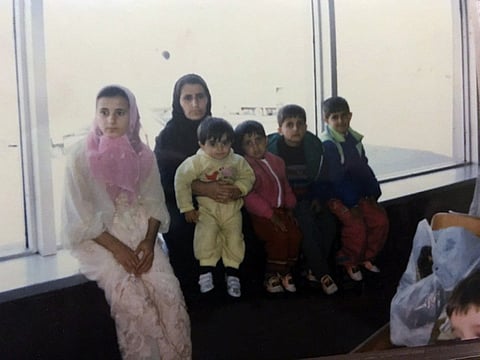Our patriotism stems from shared suffering, says Kurdish expat
Kurdish refugees growing up in Canada struggled with explaining their complicated identity

Dubai: In 1988, at the height of a Kurdish uprising for greater autonomy and the subsequent crackdown by the Iraqi government under Saddam Hussain, a mass exodus of Kurds fled northern Iraq into Iran and Turkey.
Abu Dhabi resident, Awat Yasin, was only a few months old when his parents along with around 500,000 other Kurdish families made the trek to Turkey on foot in the dead of winter.
They spent a couple of weeks stranded on the border until Turkey, under massive international pressure, let them in.
His family was sent to a camp in Diyarbakir where Awat only has vague recollections-he largely relies on stories his parents have shared with him.
“My parents are from a small village in northern Iraq near the Turkish border and the situation during those times was so bad that a child they had before I was born died of starvation,” he told Gulf News.
Awat’s family spent three years in a refugee camp in Diyarbakir before their asylum application was processed and they moved to Ontario Canada.
Growing up the multi-ethnic country, Awat made friends with people from various backgrounds.
“It was difficult for me because most people can identify as Serbian or Syrian. Its hard to explain to people that I am from Iraq but I’m Kurdish-its a sort of binary ethnicity,” he explained-the Kurdish people are considered the largest ethnic group in the world without a nation-state.
“It was tough to tell people I’m Kurdish-not from an emotional standpoint but because the person on the receiving end would have no idea what you are talking about so you would have to go through the whole circus of explaining to them the geopolitical reasons,” he says.
Hevi Serdar, another Kurdish immigrant to Canada, currently a Dubai resident, also struggled with her identity.
“Many immigrants often struggle with balancing their identity between their home country and Canada, but Iraqi Kurds already come from a country where they don’t really identify with. So it was an added burden on us,” she tells Gulf News.
“Am I Iraqi, Kurdish or Canadian? It was a question I always had to ask myself.”
She eventually settled on Canadian, distancing herself from her Kurdish roots and traumatic early years in Kurdistan-her family witnessed the infamous Halabja massacre first-hand and spent time in prison for their humanitarian activism (Hevi actually spent her first months as an infant in prison before her grandmother was able to bail her out)
“Eventually I came to the realisation that in order to move forward in life you need to understand where you came from. In my early adulthood I started to reconnect with my Kurdish roots,” she said.
She eventually visited Kurdistan to confront her past head-on. She even visited the prison where she spent her first months as a baby. She hopes to have a book out by next year narrating the hardships her and her parents faced, to spread awareness about the Kurdish struggle.
“It was an incredible experience and made me realise that you really can’t put a price tag on knowing who you are and where you came from.”
For Awat, Kurdish identity and culture was always ingrained in him and his 9 brothers and sisters at home through speaking the language, food, dance and being involved in Kurdish clubs.
“I think a lot of our patriotism stems from shared sufferings our families experienced living in various countries where they were not afforded their human rights,” he says.
Awat dismisses criticism that Kurds are trying to carve out territory rightfully owned by another country.
“The land we live on is historically Kurdish so we are not taking away someone else’s land by establishing a state,” he says.
“The Kurds have tried different ways to gain their rights, but unfortunately this hasn’t happened and we see independence as the only way to ensure those rights,” he says.



